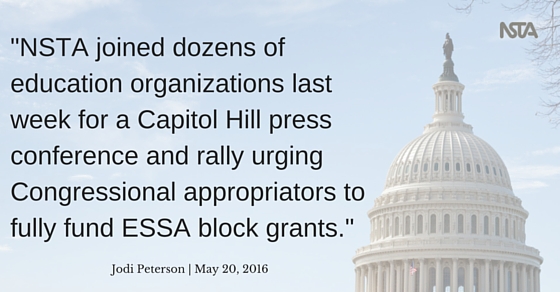Legislative Update
ESSA Webinar and Rally on Capitol Hill
By Jodi Peterson
Posted on 2016-05-20
Update on Every Student Succeeds Act
Almost 200 teachers and science leaders tuned into the NSTA Learning Center webinar last week on the new federal education law (ESSA), co-hosted by NSTA and the National Science Education Leadership Association (NSELA). You can find the powerpoint from the webinar here and learn more about the new federal education law here.
As states gear up for implementation of ESSA, more heated debate around the regulatory language for ESSA’s supplement-not-supplant provision, which says that federal Title I funds for low income students must be in addition to, and not take the place of, state and local spending on K-12. (Drafts of the regulations are in circulation, however the Department of Education (ED) is expected to officially release regulations for comment on accountability, state plans, supplement-not-supplant and assessments this summer.) Education Week reports that a recent Congressional Research Service report on ED’s proposed regulations are outside of the statutory language that ESSA allows.
Republicans (and unions) are concerned that ED officials would violate the new law by requiring districts to use a school-level test of expenditures to show compliance with supplement-not-supplant, which could ultimately mean monitoring teacher salaries when calculating how much schools receive. Many Democrats believe this provision will provide an important tool to ensure the new federal law provides equity. Senator Lamar Alexander, a chief architect of the new federal education law, recently said that the Education Department has been “deceitful” in trying to force equity through implementation of the new education law.
Ed Groups Rally for ESSA Title IV Block Grants
NSTA joined over 75 organizations last week for a press conference and rally on Capitol Hill urging Congressional appropriators to fully fund Title IV, Part A of the Every Student Succeeds Act (ESSA).
Congress authorized this flexible ESSA block grant, known as Student Support and Academic Enrichment Grant, at $1.65 billion for FY 2017. Congressional appropriators are now working to provide funding amounts for this and other FY2017 federal education programs. The Title IV grants will provide funding to districts for activities in three broad areas:
1) Providing students with a well-rounded education (e.g. college and career counseling, STEM, arts, civics, IB/AP)
2) Supporting safe and healthy students (e.g. comprehensive school mental health, drug and violence prevention, training on trauma-informed practices, health and physical education) and
3) Supporting the effective use of technology (professional development, blended learning, and devices).
Specifically, in regards to the use of Title IV A funds for STEM, districts and states can use grant monies to expand high-quality STEM courses; increase access to STEM for underserved and at risk student populations; support the participation of students in STEM nonprofit competitions (such as robotics, science research, invention, mathematics, computer science, and technology competitions); provide hands-on learning opportunities in STEM; integrate other academic subjects, including the arts, into STEM subject programs; create or enhance STEM specialty schools; integrate classroom based and afterschool and informal STEM instruction; and expand environmental education.
Myra Thayer, Prek-12 Science Coordinator, Fairfax County Public Schools, was NSTA’s guest speaker at the press event. She told participants that “Providing students with hands-on learning opportunities in Science, Technology, Engineering, and Mathematics (STEM), increasing access for underserved students, and integrating afterschool STEM experiences with classroom-based learning will improve instruction and student engagement in these fields. It’s critical that Congress fully fund the ESSA Title IV-A, Student Support and Academic Enrichments Grants, so that all students have access to quality STEM programs, and to a variety of health and safety programs, diverse academic courses, and modern technology.”
At the press event/rally the group also released individual letters from state and local groups in Minnesota, Missouri, Oklahoma, Tennessee, and Washington, seeking full funding for this grant.
In addition to seeking funding for Title IVA at $1.65 billion NSTA, the STEM Education Coalition and 85 other organizations, is asking Congress to
- Provide $2.250 billion for the Every Student Succeeds Act (ESSA) Title II Supporting Effective Instruction State grants. This program provides support for teacher quality improvement initiatives, including professional development and teacher leadership.
- Support the proposal of $100 million for the new Computer Science for All Development Grants.
- Provide $10 million for a STEM Master Teacher Corps which was authorized through Section 2245 of ESSA. This program would help cultivate teacher leaders in STEM subjects and promote the sharing of best practices across the teaching professions.
These programs will be part of the FY2017 Labor, HHS, and Education appropriations bill. Advocates expect to see some Congressional action on this bill in mid-June. Stay tuned.
Jodi Peterson is Assistant Executive Director of Legislative Affairs for the National Science Teachers Association (NSTA) and Chair of the STEM Education Coalition. e-mail Peterson at jpeterson@nsta.org; follow her on Twitter at @stemedadvocate.
The mission of NSTA is to promote excellence and innovation in science teaching and learning for all.
Follow NSTA
Disclaimer: The views expressed in this blog post are those of the author(s) and do not necessarily reflect the official position of the National Science Teaching Association (NSTA).



